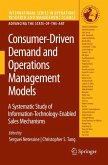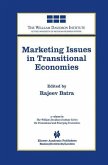Do we need a new car or a new refrigerator every ten years? What happens to our PC which is exchanged for a new model every three years? Why do our shoes last only a year or so, while those of our great grandfather served for a genera tion? Are businesses deliberately marketing products in a way which encourages sub-optimal use and induces consumers to buy new products? More and more consumers respond ''yes'' objecting to the business practices which reduce the life span of a product or pay no attention to efficiency in con sumption. The growing concem with sub-optimal use of consumer durables arises as a response to the volume of waste, as wen as to the growing conviction that over-consumption is encouraged by marketing techniques and approaches that favor lesser durability and sub-optimal use. There are signs that those things will have to change. Firstly, client orientation - a condition sine qua non of marketing success in the saturated markets of rich countries - is gaining popularity. Consumers are better informed and more influential and "intelligent consumption" is on the rise. Buyers are becoming more and more hostile towards marketing manipulation, inducing them to consume faster, more and at higher prices. The public increas ingly resists messages in advertisements (preventive resistance) which are pre dominantly persuasive (rather than educational or informative) and conceived to stimulate demand for the "new", the superficial and the fashionable.
Dieser Download kann aus rechtlichen Gründen nur mit Rechnungsadresse in A, B, BG, CY, CZ, D, DK, EW, E, FIN, F, GR, HR, H, IRL, I, LT, L, LR, M, NL, PL, P, R, S, SLO, SK ausgeliefert werden.









